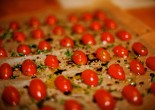I’ve recently started reading McGee’s classic — On Food and Cooking. It had been recommended many times both by my father, and amazon recommendations (not that I really take them all that seriously). It’s fantastic. I love it.
Being a bit of an intrepid scientist at heart, I like cookbooks/guidebooks/&c. that don’t tell you the whole story. I like it when a cookbook doesn’t tell you eveything about a given recipe. They explain in detail the important parts required for the recipe to work, but leave the main directions (or experimentation so to speak) up to a little bit of interpretation. Not only does it make the book so much more worthwhile, but if it’s written correctly (as it is with McGee), it becomes far more fascinating to read. I like understanding the scientific basis behind all sorts of things. Working out how and why things/reactions/experiments/products work the way they do, and given this information, how you can game it (so to speak) in order to achieve the best possible result. Kind of a minimum input maximum output sorta approach, but so much more.
It’s a little hard to explain I guess, so I think my point is best served with an example. From On Food and Cooking and on the subject of using copper bowls for eggs:
“It turns out that along with a very few other metals, copper has the useful tendency to form extremely tight bonds with reactive sulphur groups: so tight that the sulfur is essentially prevented from reacting with anything else. So the presence of copper in foaming egg whites essentially eliminates the strongest kind of protein bond that can form, and makes it harder for the proteins to embrace each other too tightly. Sure enough, if you whip egg whites in a copper bowl — or in a glass bowl to which you’ve added a pinch of a powdered copper supplement from a health food store — the foam stays glossy and never develops grains. A silver plated bowl will do the same thing.”
These are my sort of books, and I think this particular strategy works particularly well with cooking and cookbooks. Ultimately it’s super-applied chemistry, but rarely is it presented in that fashion. There are surprisingly few books where the details in the methods are explained, allowing the actual recipes to be glossed over, or to take a back seat. I feel that most of the time, the recipe is the obvious bit, the ingredients are generally open to a bit of interpretation, however what you need is essentially the minimum effective dose for the reaction that the dish is based on to work successfully.
There are a few more books like this that I’ve encountered. The first similar one that I found, and enjoyed, was the Bread book in Hugh Fearnley-Wittingstall’s River Cottage Handbooks collection. It had recipes for various breads, but it didn’t just jump into that. It went though some simple theory behind it (yeasts, rising, sourdough starters &c.) and particular points or changes that you could make in order to improve the bread, like keeping the oven humid. It made the point that bread is better when baked in a humid envoronment, acknowledged that most ovens aren’t particularly humid, and came up with a solution on how to make them humid (have a pan at the bottom of the oven in which you pour boiling water as you put the bread in to produce steam). It’s pretty much coming up with a problem, and developing a feedback loop to solve it. I wish more books were like this. I suppose it is the way I think, but it’s wonderfully logical too.
The Four Hour Chef by Tim Ferriss does this too to some extent. In the later sections of the book he outlines some important reactions (The Maillard reaction, for example) and explains why they form, what dishes you may have had where they play an important part, presents a dish that showcases the reaction brilliantly, and how, in the future, if you’re making a particular dish, what you can do to best make the reaction perform successfully. At times he could go into more detail, but I think at an intro level, it’s perfect. Not too sciencey, and sufficiently pop culturey and laddish to be accepted by a large audience. McGee plunges the depths that Ferriss’ Four Hour Chef lacks. It’s detailed, perfectly explained, and draws on significant historical theory and scientific background to make a pleasant reading experience. Not for everyone, but it really hits the nail on the head for those burgeoning molecular gastronomy types.
